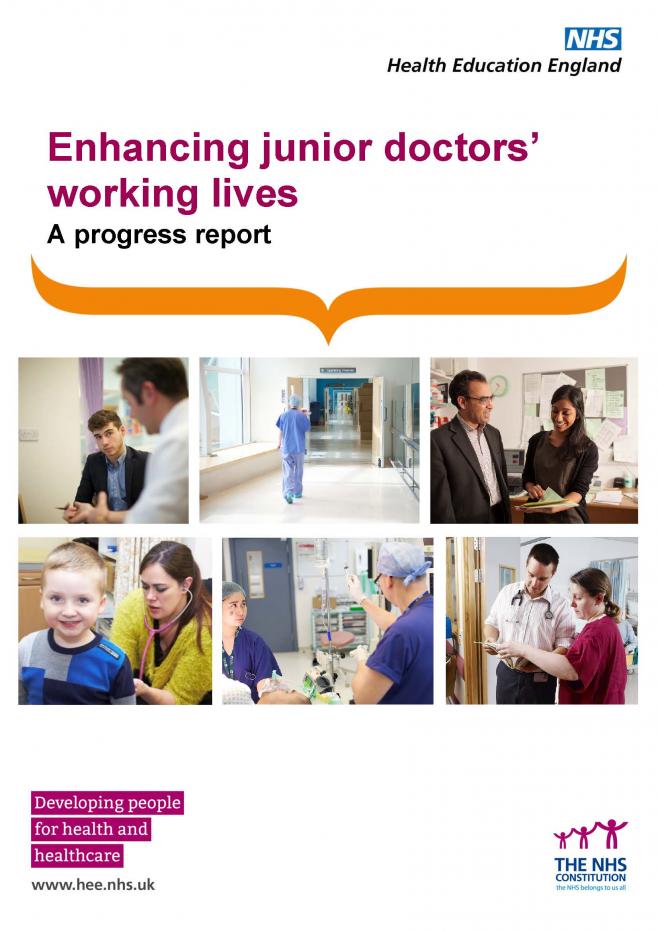You are here
Enhancing junior doctors' lives
14 March 2017

A comprehensive update report has been published today highlighting the progess made by Health Education England to enhance juniors doctors’ working lives
The junior doctors’ contract dispute highlighted a number of issues involving their training and working environment. Reports of low morale, unhappiness, anger and disillusionment were widespread.
Common concerns involved issues that sat outside the contract itself and included: lack of timely information about rotations and on-call duties; different interpretations of the many rules around flexibility in training; and the rising costs of developing as a professional.
HEE established a working group with partners including the British Medical Association Junior Doctors’ Committee (JDC), General Medical Council, NHS Employers, Academy of Medical Royal Colleges and trainee representatives and targeted ten specific issues for action.
Today’s report updates the work undertaken by HEE and partners on these initiatives and proposes next steps for further action.
HEE has given its ongoing commitment to improving the quality of education and training for doctors, ensuring that they feel valued and supported and that they are key components in all aspects of care, and starting to re-build morale.
Some of the key areas for action included:
- increasing the focus on valuing healthcare staff including junior doctors;
- committing to reducing inequity in study leave ensuring that essential costs of training are not borne by junior doctors;
- creating more flexibility to doctors with regard to deployment which will benefit doctors with special circumstances who need to train in a certain area, and those who want to train in the same areas as their partner and those who want to move region; pilots planned to look at different ways to increase flexibility in training, optional reductions in hours, and allowing doctors to pursue less pressured training opportunities in parallel to standard training programmes and
- new legal protection for juniors raising patient safety concerns.
Professor Wendy Reid, Director of Quality and Education and Medical Director, Health Education England said:
This report makes clear the excellent progress made on addressing some of the challenges that were highlighted to us by doctors in training ranging from new legal protection for juniors raising patient safety concerns and the impact on their training to an agreement that HEE will develop a policy to enable joint applications from couples.
It is important that we demonstrate to junior doctors that we have listened to their concerns and issues and that we have acted to resolve them.
Junior doctors should not have to compromise their training to deliver the service.
I am grateful to all those who have contributed to this work over the past eighteen months. There is clearly more to do, and HEE will work with all concerned to continue to raise the quality of training and the quality of doctors’ working lives.
Royal College of Physicians President Professor Jane Dacre said:
We welcome the work of the HEE working lives group as we want to see all trainees valued, supported and motivated to provide the best possible care for patients. I am also delighted that the RCP's Chief Registrar programme has proved so valuable in demonstrating how trainees can train more flexibly and develop professional capabilities in addition to their clinical knowledge and skills.
The Chief Registrar programme is a durable legacy of our Future Hospital Programme, and I look forward to supporting HEE in developing the scheme to benefit a greater number of trainees. By making training more rewarding and improving morale, we also improve patient care.
NHS Employers Chief Executive, Danny Mortimer, said:
NHS leaders and the public have the highest respect for the talent and commitment of; junior doctors. We know they are, like other colleagues, feeling the impact of unprecedented demand and it’s absolutely right that organisations including the NHS Employers, the BMA and Health Education England should work together to develop improvements to their training and working arrangements.
Employers will welcome therefore the actions to support junior doctors, which can be delivered as a result of this publication, whilst recognising there is much work still to be done to address the concerns raised during 2015 and 2016.
Professor Dame Sue Bailey, Chair, Academy of Medical Royal Colleges said:
For too long junior doctors’ well-founded concerns about their working conditions, costs of training and the level of support they receive to do some of the hardest jobs in healthcare were being ignored. This clear and insightful report should help us to draw a line under the difficulties of the past so that trainees can feel valued – as they rightly should. The Academy looks forward to playing its part in helping to ensure these recommendations are put in to practice for the benefit of all NHS staff and the patients they care for.
Dr Kathy McLean, Executive Medical Director at NHS Improvement, said:
This report helpfully brings in to focus the challenges expressed by junior doctors and the areas of support we need to look at. We recognise that there is clearly more that needs to be done to improve the working lives of doctors in training, and we will now work with Health Education England, and other health bodies, to facilitate the changes needed.
Our junior doctors are an integral part of delivering great services to patients across the NHS. We will continue to work alongside providers to make sure they are doing what they can to support junior doctors to ensure they feel like valued members of the team.
Charlie Massey, Chief Executive of the GMC, said:
It is clear to all of us working in the health system that for some time there has been a raft of non-contractual issues, across the UK, that have eroded morale among junior doctors. The way in which post-graduate training has developed has contributed to some of the problems that currently exist, and the GMC will be setting out our conclusions on how those need to addressed at the end of March.